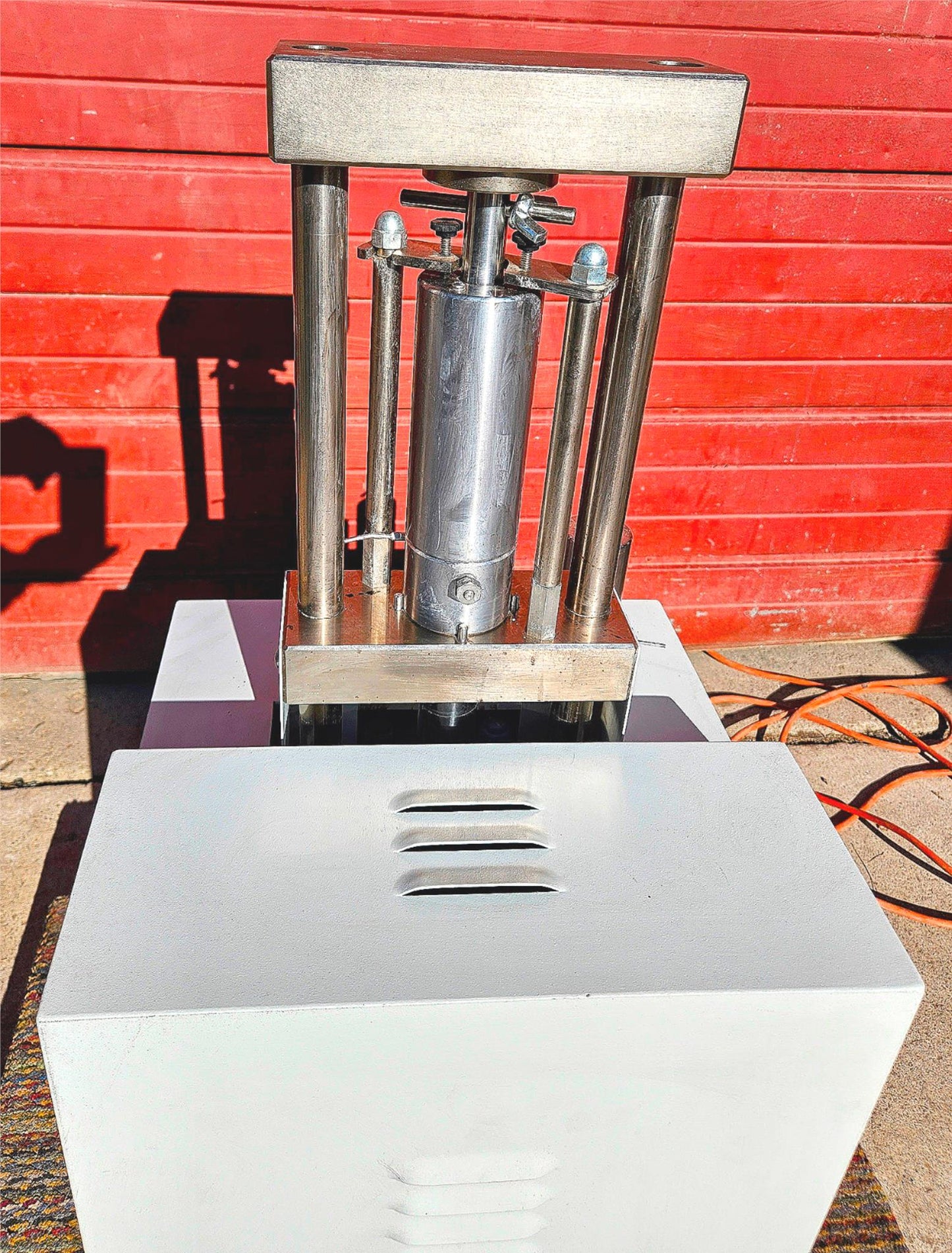THERMO IEC LAB FRENCH PRESS 3000psi & 2 PRESSURE CELLs 90DAYWARRANTY WATCH VIDEO
THERMO IEC LAB FRENCH PRESS 3000psi & 2 PRESSURE CELLs 90DAYWARRANTY WATCH VIDEO
This listing is for a THERMO SPECTRONIC IEC FA-078A 3000 psi LABORATORY FRENCH PRESSURE CELL PRESS with Two Extra Bonus Pressure Cells as can be seen in the pictures.
Please feel free to watch a video of this specific THERMO IEC FA-078A LABORATORY FRENCH PRESSURE CELL PRESS 3000psi working by clicking: https://www.youtube.com/watch?v=mfEt7vLfDA8
Includes the following Two Pressure Cells below Shown in the Pictures and also in the Video:
- 1 FA-301 PRESSURE CELL
- 1 FA-003 PRESSURE CELL
As can be watched in the Video this THERMO IEC FA-078A LABORATORY FRENCH PRESSURE CELL PRESS 3000psi has been tested and performed fine.
PLEASE CHECK MANUFACTURER's DATA INSTRUCTION SHEET ON THIS THERMO IEC FA-078A LAB PRESS BY GOOGLING THE FOLLOWING LINK IN BLUE ITALICS: conquerscientific.com/wp-content/uploads/2022/10/thermo-iec-french-press_operators-manual.pdf
This THERMO IEC FA-078A LABORATORY FRENCH PRESSURE CELL PRESS came from a Federal University and has ALWAYS been very well taken care of, Please WATCH VIDEO!
- 120 volts Standard Outlet
- 100 Watts
Bar none, these units are the best piece of laboratory equipment for isolation of thermally sensitive or difficult to solubilize prokaryotic or eukaryotic fusion proteins!
Our staff has completely inspected the unit to insure integrity of the hydraulics, electronics, and pressure cell. Press case is painted with rust proof oil-based pain.
Hydraulic fluid is full with hydraulic fluid--Mobil DTE26.
This hydraulic French press has no leaks.
120V Power Cord.
FREE SHIPPING TO ANY CONTINENTAL USA BUSINESS LOCATION WHERE BUYER CAN UNLOAD IT OFF THE DELIVERY FREIGHT TRUCK VIA A DOCK, A FORKLIFT OR TWO STRONG GUYS!
IF BUYER DOES NOT HAVE THE MEANS TO UNLOAD IT AT DELIVERY (NO DOCK or FORKLIFT) THEN THERE WILL BE A $150 SPECIAL LIFTGATED FREIGHT TRUCK DELIVERY FEE.
TECHNICAL INFORMATION IN ITALICS BLUE BELOW WAS TAKEN FROM THE WEB:
conquerscientific.com/wp-content/uploads/2022/10/thermo-iec-french-press_operators-manual.pdf
The FRENCH Pressure Cell is a dispersion unit for disintegrating chloroplast material, blood cells,
unicellular organisms, homogenates of animal tissue, and other biological particles. Use of the
pressure cell allows destruction of the cellular walls of a sample while leaving the cell nucleus
undisturbed. FRENCH Pressure Cells are available in manual-fill and rapid-fill configurations.
Manual-Fill 40K Cell (FA-032) Manual-Fill Mini-Cell (FA-003)
Maximum Working Pressure 40,000 psi Maximum Working Pressure 20,000 psi
Cell Capacity 35 ml Maximum Compressive Force on piston
2,200 lbs
A loading stand is provided for filling the cell. Cell Capacity 3.7 ml
FRENCH Presses are the primary sample preparation tools in protein studies, extraction of nucleic acids and cell disruption of various prokaryotic and eurkaryotic cells, among others.
The press provides a rapid, inexpensive, and effective mechanical means for gentle disruption of cell membranes and cell walls including nuclear membranes and mitochondrial membranes.
This pressure-induced process results in more uniform and complete disruption than possible with other mechanical, ultrasonic, or harsh chemical methods.
These units are particularly effective for isolation of often insoluble bacterial fusion proteins.
This FRENCH Presses can exert of up to 3,000 psi of internal pressure resulting in excellent performance.
This hydraulic motor Driven Laboratory Press is easy to operate and offers the advantages of dual-range, single control pressure selection.
This provides a regulated working pressure throughout the entire operating stroke, resulting in uniform and complete disruption.
Fine control of the internal cell pressure expands and extends the range of the system for use in a variety of different applications.
Specifications
PRESS part no. FA-078A
Height
Weight (net) 340 lbs
Weight (shipping) 389 lbs
Dimensions
Power Required 115 V, 60 Hz, 50 Hz
Applications
• Enzyme preparation and isolation
• Cell extract preparation
• Bacterial and plant tissue disintegration
• Recovery of intercellular proteins and nucleic acid
• Preparation of viral antigens for EIA test kits
• Membrane preparation for phizobia and pseudomonads
• Disruption of cells for pigment analysis.
The French pressure cell press, or French press, is an apparatus used in biological experimentation to disrupt the plasma membrane of cells by passing them through a narrow valve under high pressure. The French Press can also be used for disintegration of chloroplasts, homogenates of animal tissue and other biological particles. It is capable of disrupting cell walls while leaving the cell nucleus undisturbed. The French press was invented by Charles Stacy French of the Carnegie Institution of Washington.
The press uses an external hydraulic pump to drive a piston within a larger cylinder that contains the liquid sample. The highly pressurized sample is then squeezed past a needle valve. As the sample passes through the valve, the fluid experiences shear stress and decompression, causing cellular disruption. The major components of a French press are made of stainless steel to prevent sample contamination.
A French press is commonly used to break the resilient plasma membrane and cell walls of bacteria and other microorganisms for isolation of proteins and other cellular components. The disruption of cells in a French press generates 'inside-out' membrane vesicles which are required for many in vitro biochemical assays. The cell is typically chilled overnight before use to preserve enzymatic activities. Disadvantages of the press include that it is not well suited to processing of large sample volumes, and is somewhat awkward to manipulate and clean due to the weight of the assembly (about 30 pounds (14 kg)). Certain types of samples may clog the valve.
Other technologies, such as sonication and ball mills, are available for many of the same purposes, and have their own advantages and disadvantages. For example, sonication can generate high shear forces that break cellular DNA into small fragments. With a French press, the shear force can be carefully modulated by adjusting the piston pressure. The Press provides a single pass through the point of maximum shear force, limiting damage to delicate biological structures due to repeated shear, as occurs in other disruption methods.
STOCK # 223907
Couldn't load pickup availability
Out of stock
View full details























